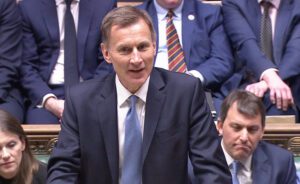Public borrowing in February rose to a high for the month as the government paid out significant subsidies to cap energy bills for households and businesses, official figures show.
Net borrowing hit £16.7 billion last month, up by £9.7 billion compared with the same month in 2022, and the highest level of February borrowing since records began in 1993, according to the Office for National Statistics.
The main reason for the increase was a £6.4 billion rise in government spending on subsidies such as the energy price guarantee, which caps the average household energy bill at £2,500 a year.
Public sector net debt hit 99.2 per cent of GDP last month, pushing the debt-to-GDP ratio to levels last seen when Britain was rebuilding after the Second World War in the early 1960s.
The government borrowed a total of £132.2 billion in the financial year to February to record the third highest cumulative borrowing over that period since monthly records began 30 years ago. The figure is £15.5 billion higher than in the same period last year.
The cost of servicing government debt, which is affected by the retail prices index measure of inflation, fell slightly to £6.9 billion, from £8.2 billion in the same month last year, but remains high by historical levels. The RPI has been in double digits since last April.
Jeremy Hunt, the chancellor, said: “Borrowing is still high because we’re determined to support households and businesses with rising prices and are spending about £1500 per household to pay just under half of people’s energy bills this winter.
“What will bring these costs right down is lower inflation, which is why it remains one of our top priorities to halve it this year, alongside growing our economy and reducing debt.”
Michal Stelmach, senior economist at KPMG UK, said: “We expect the outlook for public finances to improve over the coming months thanks to an expected £40 billion fall in energy and cost-of-living subsidies in 2023-24, as well as the recent fall in government bond yields and RPI inflation which together determine the cost of servicing debt.
He added that KPMG’s forecast for growth is lower than the OBR’s, with expected GDP 3 per cent lower by 2027-28. This could “easily wipe the current headroom of £6.5 billion to meet the fiscal rule of falling debt.”
The chancellor announced in his Budget last week that he would meet his fiscal target to get debt falling as a share of GDP by 2028 with the smallest margin for error any chancellor has had since 2010, when the Office for Budget Responsibility was established. The OBR is the government’s tax and spending watchdog.
Ruth Gregory, deputy chief UK economist at the Capital Economics consultancy, said the big risk for the government is that a “further escalation in the banking crisis causes a deterioration in the fiscal outlook as the hit to the public finances from weaker economic growth is only partially cushioned by lower gilt yields”.
She said cumulative borrowing for the current financial year is set to come in well below the level forecast by the OBR last week. This and the inclusion of policy reforms to student loans in the national statistics from next month will push borrowing down by billions.
Read more:
Energy subsidies lift UK borrowing to February high
























